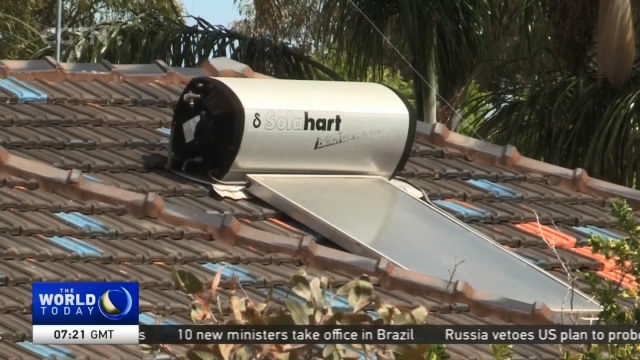
15:39, 11-Apr-2018
Technology Innovation: Blockchain technology makes energy use more efficient

Blockchain is an emerging digital technology that is currently used for trading cryptocurrencies including Bitcoin. One Australian company is using that to change the way people use and trade renewable energy - to help make it cheaper, and make energy use more efficient. Greg Navarro explains.
For the last 2 years, Martin Anda has taken some unique steps to building a new home. The Murdoch University environmental engineer is practicing what he teaches. And he's hoping to take part in a renewable energy-sharing program currently being tested in this environmentally sustainable community.
MARTIN ANDA ENVIRONMENTAL ENGINEERING, MURDOCH UNIVERSITY "To see to what extent we can use the local solar micro-grid to buy additional power when we need it in the peak periods and maybe even a night too."
The concept of residents sharing energy generated by solar power here in this innovative Fremantle neighbourhood was created by Jemma Green.
JEMMA GREEN CO-FOUNDER AND CHAIRMAN, POWER LEDGER "I was trying to find software that could allocate electricity that was coming from solar panels and batteries to each apartment and if people weren't home to consume their electricity they could trade it with their neighbours."
The answer was blockchain technology - a digital form of trading commonly used for cryptocurrency bitcoin.
PHILIPPA RYAN LECTURER IN LAW, UNIVERSITY OF TECHNOLOGY SYDNEY "So what blockchain does is it says, ok so you want to either send value or send some information and you want to use the internet to do it. You set up your end of the transaction, a counter party sets up their side of the transaction - let's say one person in Montreal the other person is in Shanghai - the blockchain will establish what each other has promised to do."
Green co-founded a company called Power Ledger - which is using blockchain technology to allow residents to buy and sell the electricity they generate through solar power.
GREG NAVARRO FREMANTLE "When applied to energy, blockchain basically cuts out the middleman and some of the bureaucracy. It allows people to buy and sell energy directly, making it cheaper and making the system more efficient."
JEMMA GREEN CO-FOUNDER AND CHAIRMAN, POWER LEDGER "So in the case of electricity markets, they typically settle payments every 80 days so it is a very long time for people to get paid, organisations to get paid, even on your bill if you are selling electricity back to your retailer you get a bill every 60 days so you are waiting for that long to be paid for the electricity that you are selling back to the retailer."
The pilot program has peaked the interest of Western Power which owns the power poles and wires across Western Australia.
ALISON MORLEY HEAD OF BUSINESS DEV'T, WESTERN POWER "We want to understand how that is going to go back into the grid and make sure the grid is ready for the future because there are a lot of changes we are going to need to make to ensure that everybody can use the grid in the way that they want to."
Australia is home to some of the highest electricity prices in the developed world. It also produces relatively low cost solar power making it an ideal test site for this program.
JEMMA GREEN CO-FOUNDER AND CHAIRMAN, POWER LEDGER "People are more aware of the electricity they are using and awareness brings more efficient behaviour - that's one thing, and within this development a lot of people actually purchased the homes because of the sustainability features of the development which includes the renewable energy."
Martin Anda is proud of the home he's creating.
MARTIN ANDA ENVIRONMENTAL ENGINEERING, MURDOCH UNIVERSITY "I feel we all have a responsibility to show at least a small amount of leadership in what we can do."
And he's doing that in a growing community built on promoting sustainable living. Greg Navarro, CGTN, Fremantle.

SITEMAP
Copyright © 2018 CGTN. Beijing ICP prepared NO.16065310-3
Copyright © 2018 CGTN. Beijing ICP prepared NO.16065310-3